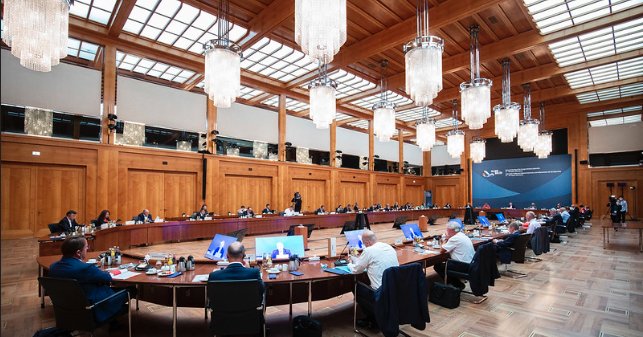Ultimately, as President von der Leyen said, “[m]ajor powers are either pulling out of institutions or taking them hostage for their own interests”. In a twisted way, it is also the case that the EU, as an institution, is suffering from the external influence of foreign powers, through proxies, as a result of its foreign policy unanimity rule.
And that is why the reform proposal from the Commission is as important as it is unlikely to occur.
Many EU governments now have close relations with countries like China and Russia. Some, like Cyprus, have a historical and economic affinity for Russia, while others, like Hungary, share something of its ideological mindset. Still others, such as Greece, Hungary or Portugal, simply are at the receiving end of Chinese investment in key infrastructures. This has restricted their willingness to call out human rights abuses.
And then there is Germany. During the euro crisis, as it faced a slump in consumer spending across its traditional export market, the German economy oriented itself towards exporting its high-quality goods to China with gusto. Now, Germany is moving in the opposite direction as it faces Chinese dumping and a closed-off market.
China: Economic Pressure
During the euro crisis, China invested across Europe, particularly in infrastructure projects. Perhaps the best-known example is the acquisition of the Piraeus port in Greece, which handles roughly half of the country’s trade in goods through a Chinese state-owned company. However, on September 10 2020, the European Court of Auditors found multiple economic and political risks in Chinese investment.
China has also created the 17+1 Group, signing bilateral agreements with most Central and Eastern European countries – as well as Italy – as a part of its Belt and Road Initiative. These investment agreements breach EU norms and may infringe on the bloc’s common commercial policy.
But it is also an issue for countries that, like Germany, have grown to rely on China as an export market during the euro crisis. Indeed, Angela Merkel’s government has taken a very pro-China line against the opinion of its own intelligence agency – including, for instance, over Huawei’s participation in the 5G rollout.
Her Council Presidency had originally hoped to host a summit in September in Leipzig to celebrate the coming together of an EU-China bilateral investment agreement. Ultimately, this did not happen, and not just because of COVID. China refuses to further open its own markets, especially the procurement market, to foreign firms – and its companies engage in anti-competitive dumping to boot. The result has been a turn-around by the German business community towards trade defence (or protectionism, depending on the point of view).
Instead of signing an agreement facilitating FDI in China for European firms and in China’s public procurement markets (and vice versa), an agreement recognising geographic indicators was as far as China and the EU have gotten in 2020.
Russia: Ideological Affinity
As mass protests continue in Belarus, the Cypriot government has blocked EU efforts to sanction Belarus’ government. The rationale? Cyprus wants the EU to first sanction Turkey over that country’s infringement of Cyprus’ territorial waters.
The European Union has a duty to defend its Member States and they, in turn, have a duty to defend one another. The Cypriot government is right to demand that its partners back it up against an aggressive Turkey. However, the choice of where to take a stand might be more than coincidental.
Lukashenko is an ally of Russia. And Cyprus has a special connection to Russia, for several reasons. One is more cultural as both countries are majority Christian Orthodox. The others are more significant.
Cyprus is notorious for selling citizenship to wealthy foreigners. Of those who have bought this special privilege, about half have been Russian. Cyprus has also served as a tax haven for wealthy Russians and Russian firms – so much so that in early September, Russia announced punitive measures to stop the flow. Those depositing their money in Cyprus, not very surprisingly, include President Lukashenko’s family members.
It is hard to argue then, that Cyprus might not also have economic arguments in mind when blocking sanctions against Lukashenko. It is also not the first time Cyprus has acted in a clearly pro-Russia manner. Cyprus was one of the countries opposed to introducing an EU Magnitsky Act, together with Greece, Italy and Hungary.
But why would Hungary or Italy ever do the same? Yes; and the reason is ideological.
The style of LGBT-phobic, nationalistic, authoritarian rule that Putin has created has become a model for other would-be far-right leaders within the EU. Hungary’s Viktor Orbán has a close relationship with Moscow, owing to their ideological affinity. Orban has repeatedly threatened to veto sanctions against Russian oligarchs as late as this September, and he has also slowed down the negotiation of the Association Agreement with Ukraine.
Likewise, the Italian far-right party Lega Nord, formerly in power, has formal cooperation agreements with Russia’s ruling party, United Russia. It is no surprise that during their latest stint in power, from 2018-2019, the Italian coalition agreement called to lift Russian sanctions. The government then blocked their extension to other Russian lawmakers and opposed an EU Magnitsky Act.
Other far-right parties, like Marine Le Pen’s Rassemblement National (National Rally) have been financed by Russian banks, which now want their money back. Austria’s FPÖ, has in turn also signed a cooperation agreement with United Russia. Party leaders have called for an end to sanctions and thawing relations with Moscow. The former FPÖ Austrian foreign minister, Karin Kneissl, even invited Putin to her wedding.
It should not be too surprising, then, that the FPÖ left the government after evidence emerged of party leaders asking for money from a woman pretending to be a Russian oligarch’s niece.
The Institutional Problem
Ultimately, the problem is not that European countries have foreign and trade policy preferences, or even that third parties try to manipulate domestic actors and governments.
Political preferences are a natural element of the EU system, and they are usually resolved through difficult compromises, by postponing decisions, or by, bit by bit, developing common strategies to address these issues. The Next Generation EU is the perfect example.
Third party involvement is an unwelcome, but not totally unexpected element of politics, particularly for small countries living in the shadow of a larger one like Russia.
The real issue arises when these two elements mix together in a system that requires unanimous agreement even for the simplest declaration. Requiring unanimous support to simply condemn the ethnic cleansing of Uyghurs in Xinjiang or the attempted murder of Alexei Navalny or any other issue never made much sense.
These condemnations are symbolic statements, with little coercive force. They do become a liability when the EU fails to issue them despite the EU’s message that it seeks a multilateral, democratic global order.
Failing to deliver is a big failure, especially when there is no price tag. The same holds for sanctions. Punishing dictators or their lackeys for human rights abuses is the moral thing to do and failing to implement them makes the EU look like a hypocritical pushover.
Council President Michel argued that unanimity “promotes a lasting commitment” from the Member States and allows them to “draw strength from our unity”.
But from the outside, it does the opposite. When third parties seek to influence the EU’s foreign policy, using the Member States as proxies, in order to prevent the EU from upholding its values abroad, then unanimity does not equal strength but weakness.
Qualified majority voting on a limited number of issues opens the door to a faster, more efficient foreign policy. Because the world is heating up around Europe, there is a need for quick action.


Follow the comments: |
|
